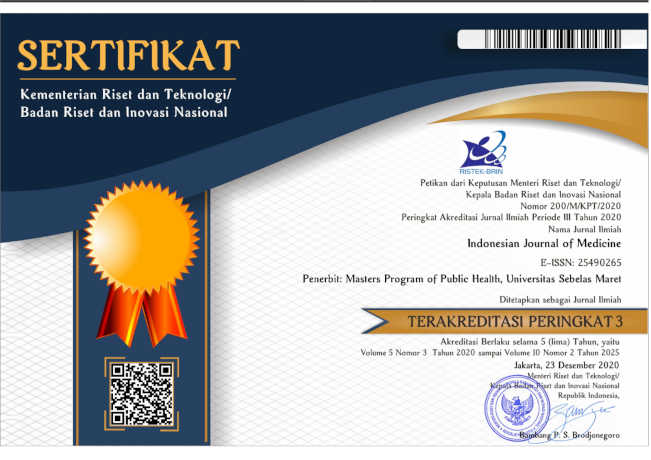The Effect of Mesenchymal Secretome Stem Cell Therapy toward Caspase-3 Expression in Pregnant Mice with Pristan-Induced Lupus Model
DOI:
https://doi.org/10.26911/theijmed.2020.5.3.298Abstract
Background: Systemic lupus erythematosus (SLE) is one of the pregnancy complications which cause an increase in fetal and maternal complications which are mainly caused by placental damage due to chronic inflammation and apoptosis. The rate of apoptosis can be assessed by the high expression of caspase-3 which is the majorexecutioner caspases of apoptosis. The use of Mesenchymal Secretome Stem Cell for SLE therapy has an anti-inflammatory and anti-apoptotic role. This study aimed to examine the effect of mesenchymal secretome stem cell therapy toward caspase-3 expression in pregnant mice with pristan-induced lupus model.
Subjects and Method: This study was a randomized controlled trial. This study was conducted at the Prodia ProStem Laboratory, Laboratory of the Faculty of Veterinary Medicine of Airlangga University, and Anatomical Pathology Laboratory, Faculty of Medicine, Airlangga University. A total of 14 healthy BALB/C female mice strain aged 6-8 weeks, with a bodyweight of 20-30 grams, were divided into two groups, (1) 7 pregnant mice who received pristan therapy only, and (2) 7 pregnant mice who received pristan therapy and mesenchymal secretome stem cell.
The dependent variable was the caspase-3 expression. The independent variable was the administration of mesenchymal secretome stem cell therapy. The caspase-3 expression was measured by an immunoreactive score. The data were analyzed using independent t-test.
Results: After giving mesenchymal secretome stem cell therapy, the mean of the caspase-3 expression in the treatment group (Mean=1.86; SD=0.66) was lower than the control group (Mean=3.30; SD = 1.42), with p=0.031.
Conclusion: Mesenchymal secretome stem cell therapy is effective for reducing caspase-3 expression in the placenta of pregnant mice with pristan-induced lupus model.
Keywords: Caspase-3 expression, lupus, placenta
Correspondence: Febrian Andhika Adiyana. Department of Obstetrics and Gynecology, Faculty of Medicine, Univesitas Sebelas Maret/Moewardi Surakarta, Indonesia. Email: FebrianAndhika@gmail.com. Mobile: 081215897960.
Indonesian Journal of Medicine (2020), 05(03): 224-229
https://doi.org/10.26911/theijmed.2020.05.03.07
References
Dos Santos N, Silva RF, Pinto MPL, Da Silva EB, Tasat DR, Amaral A (2017). Active Caspase-3 Expression Levels as Bioindicator of Individual Radiosensitivity. Anais Da Academia Brasileira De Ciencias. 89(1): 649-659. doi: 10.1590/00-01-3765201720160697.
Drago D, Cossetti C, Iraci N, Gaude E, Musco G, Bachi A, Pluchino S (2013). The stem cell secretome and its role in brain repair. Biochimie. 95:2271-2285. doi: 10.1016/j.biochi.2013.06.020.
Figueroa FE, Carrion F, Villanueva S, Khoury M (2012). Mesenchymal stem cell treatment for autoimmune disease: a critical review. Biol Res. 45: 269-277. doi: 10.4067/S0716-97602012000-300008.
Harrell CR, Fellabaum C, Jovicic N, Djonov V, Arsenijevic N, Volarevic V (2019). Molecular Mechanisms Responsible for Therapeutic Potential of Mesenchymal Stem Cell-Derived Secretome. Cells. 8(5):467.
Khurana R, Wolf RE (2017). Systemic Lupus Erythematosus and Pregnancy. Retrieved from https://Emedicine.Medscape.Com/Article/335055-Overview.
Lin L, Du L (2018). The Role of Secreted Factors in Stem Cells mediated Immune Regulation. Cell Immunol. 32-6: 24-32. doi: 10.1016/j.cellimm.2017.-07.010.
Ling N, Lawson E, Von Scheven, E (2018). Adverse Pregnancy Outcomes in Adolescents and Young Women with Systemic Lupus Erythematosus: A National Estimate. Pediatr Rheumatol Online J. 16: 26-31. doi: 10.1186/s12969-018-0242-0.
Nurudhin A, Kertia IN, Adnan ZA (2017). Effect of Secretome Stem Cells on Expres-sion Interleukin 10 and Interleukin 17 in Mice Lupus Model. Bangladesh j med sci. 16(3): 418-22. doi: 10.3329/bjms.v16i3.32862.
Ogishima D, Matsumoto T, Nakamura Y, Yoshida K, Kuwabara Y (2000). Placental Pathology in Systemic Lupus Erythematosus with Antiphospholipid Antibodies. Pathol Int. 50: 224-9. doi: 10.1046/j.14401827.2000.01026.x.
Pokrovskaya LA, Zubareva EV, Nadezhdin SV, Lysenko AS, Litovkina TL (2020). Biological Activity of Mesenchymal Stem Cells Secretome as A Basis for Cell-free Therapeutic Approach. Re-search Results in Pharmacology. 6(1): 57-68. doi: 10.3897/rrpharmacology.6.49413.
Prawirohardjo S (2014). Ilmu Kebidanan Sarwono Prawirohardjo. Jakarta. PT. Bina Pustaka Sarwono Prawirohardjo. ISBN: 9789798150258.
Sharp AN, Heazell AEP, Crocker IP, Mor G (2010). Placental apoptosis in health and disease. Am J Reprod Immunol. 64(3):159-169.
Su YJ, Cheng TT, Chen CJ, Chang WN, Tsai NW, Kung CT, Wang HC, et al. (2014). Investigation of the caspase-dependent mitochondrial apoptotic pathway in mononuclear cells of patients with systemic lupus erythematosus. J Transl Med. 12: 303. doi: 10.1186/s12967-014-0303-1.
Teixeira FG, Carvalho MM, Panchalingam KM, Rodrigues AJ, Mendes-Pinheiro B, Anjo S,Manadas B, Behie LA, Sousa N, Salgado AJ (2017). Impact of the sec-retome of human mesenchymal stem cells on brain structure and animal behavior in a rat model of Parkinson’s disease. Stem Cells Transl. Med. 6: 634-646. doi: 10.5966/sctm.2016-0071.
Vizoso FJ, Eiro N, Cid S, Schneider J, Perez-Fernandez R (2017). Mesenchymal stem cell secretome: Toward cell-free therapeutic strategies in regenerative medicine. Int J Mol Sci. 18: 1852. doi: 10.3390/ijms18091852.











